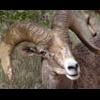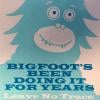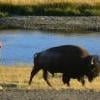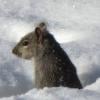We just lost one of my favorite nature writers - Barry Lopez. I had just re-read Of Wolves And Men and enjoyed it as much as the first time. RIP Barry!!

Favorite Books
#201

Posted 29 December 2020 - 07:51 AM
2019 Tundra 2019 Panther Shell
#202

Posted 29 December 2020 - 02:22 PM
We just lost one of my favorite nature writers - Barry Lopez. I had just re-read Of Wolves And Men and enjoyed it as much as the first time. RIP Barry!!
One of my favorites, too. I had the pleasure of meeting and thanking him at a Frans Lanting presentation.
I am haunted by waters
#203

Posted 29 December 2020 - 08:08 PM
RIP,read his obit in the paper yesterday.
Frank
2002 Tundra AC TRD 4WD Limited 2009 ATC Bobcat loaded http://sharychic.blogspot.com/
#204

Posted 08 January 2021 - 10:29 PM
Here is one special book -
Rivers of Wind: A Western Boyhood Remembered by Gary Penley
This is the story of two brothers growing up on a small ranch in southeast Colorado. I was gifted a copy several years ago by Gary's brother, George, a friend of Julie and I. It is a treasure and a wonderfully told story of their youth in the West.
2003 Ford Ranger FX4 Level II 2013 ATC Bobcat SE "And in the end, it's not the years in your life that count. It's the life in your years."- Abraham Lincoln http://ski3pin.blogspot.com/
#205

Posted 14 January 2021 - 08:22 AM
I’ve had the hard bound copy for years. Read it over again before passing it on to my Son.
https://www.latimes....1127-story.html
It’s available on both Amazon and Google Books, as well as the Crook County (Oregon) Library should you find yourself there waiting for an opportunity to grab some WiFi or something.
Edited by LuckyDan, 14 January 2021 - 08:42 AM.
Old, bum around in Ford and an even older FWC Grandby
New Mantra: "Everyday camping is just making up for lost time"
#206

Posted 14 January 2021 - 01:12 PM
Thanks for the suggestion... I just found a signed copy on Abes Books for $20. I love books like this.
If you can find a copy of "Disappearances" Howard Frank Mosher (VT) about a whiskey smuggler by canoe in the 1930's over the Canadian border into the Northeast Kingdom .... Quebec Bill. An incredibly entertaining book (Abes is a great place to buy used books for cheap... and if they are out of print)
2016 Duramax 2.8 Diesel long bed Colorado 4WD with 2011 Eagle
#207

Posted 14 January 2021 - 01:59 PM
New York to Nome
I’ve had the hard bound copy for years. Read it over again before passing it on to my Son.
https://www.latimes....1127-story.html
It’s available on both Amazon and Google Books, as well as the Crook County (Oregon) Library should you find yourself there waiting for an opportunity to grab some WiFi or something.
Rick Steber is an interesting author. His “Caught in the Crosshairs”, is a true story about a murder and bungled investigation that occurred near Mitchell, Oregon. It took place on the Fopiano Ranch, that was owned by one of my now deceased friends and neighbor, Jim Collins. It’s the only book I’ve ever read where I knew several of the people mentioned.
I believe Steber lives near Ochoco Summit.
I am haunted by waters
#208

Posted 14 January 2021 - 07:35 PM
Thanks for the suggestion... I just found a signed copy on Abes Books for $20)
And thank you for your suggestion.
Old, bum around in Ford and an even older FWC Grandby
New Mantra: "Everyday camping is just making up for lost time"
#209

Posted 14 January 2021 - 07:46 PM
Rick Steber is an interesting author. His “Caught in the Crosshairs”, is a true story about a murder and bungled investigation that occurred near Mitchell, Oregon..
It too in my opinion is worth considering. Probably not considered a murder mystery in the true literary sense, a good compelling story none the less.
The rhyme was purely unintentional.
Old, bum around in Ford and an even older FWC Grandby
New Mantra: "Everyday camping is just making up for lost time"
#210

Posted 16 January 2021 - 10:26 PM
"The Complete Ambler" by William Donald Needham, my favorite natural history book (by several miles). Needham's book features select natural history topics which mostly apply East of the Mississippi. Each topic was chosen to be interesting and discussed at length. The modest amount of "moralizing" could detract for some readers but the content for each topic is VERY interesting. I would not label the book as "hiking" but instead as select natural history, East of the Mississippi.
"The Forest Unseen" by David George Haskell is my second favorite natural history book (by fewer miles). Haskell's book also features select natural history topics which also mostly apply East of the Mississippi. Each topic gets a short chapter and discussed at length. Haskell's book has much less "moralizing" than Needham's but instead has more philosophy.
Both books are a pleasure to read instead of the more common massive data dump natural history book.
I have read three of George Ellison's books which are essays on natural history and enjoyed each. "Literary Excursions in the Southern Highlands" being the latest. All are described as southern highlands natural history, i.e. southern Appalachia.
Oddly, I find many more interesting and prolific natural history writers East of the Mississippi than West. The least expensive volume of Donald Culross Peattie's "A Natural History of Western Trees" is available from Amazon for $8, used+shipping, versus $35 for "A Natural History of Eastern Trees", used+shipping.
I rate natural history books based on their biographical, moral, philosophical, and science content with science (pure natural history) being most valuable and biography the lowest (i.e. topics are listed from lowest to highest value). Bernd Heinrich's "A Year in the Maine Woods" has enough biographical and fuzzy moral/philosophical content to get a mediocre rating.
Reading so much natural history did inspire me to start some field work and mosses were chosen because they can be found and studied all year including winter. Moss leaves do not die in the winter. My favorite winter moss find was "baby tooth moss" (plagiomnium cuspidatum) on a stump above a snow base of 15". "Baby tooth moss" has oval leaves instead of the very common narrow lance shaped leaves.
The moss endeavor started with reading Robin Wall Kimmerer's "Gathering Moss" which is better than mediocre but not as good as my favorites listed at the top. "Gathering Moss" has more biographical/moral/philosophical content than a favorite but discussions of executing a biological research project were interesting since I did not know how biologists reach conclusions. Two field guides followed Kimmerer's book, "Mosses, Liverworts, and Hornworts" by Ralph Pope and "Common Mosses of the Northeast and Appalachians" by Karl B. McKnight et al., and a 10x hand lens. I highly recommend "Common Mosses..." for the well defined path for identifying a moss which worked well for me. Pope's book was valuable when I found my first liverwort at the bottom of a bluff in winter.
I never expected to find a liverwort but found snake skin (conocephalum salebrosum) liverwort which is a thalloid structure. Reading all those natural history books then proved valuable. Liverworts are claimed to come from the very first land plants. Land plant evolution is liverworts to mosses to club mosses/horsetail to ferns to... The first land plants led to land animals and so humanity. Finding a liverwort is like finding the cradle of land life (now you know why I dislike the biographical/morality/philosophical book content).
Scott Weidensaul's "Mountains of the Heart, a Natural History of the Appalachians" (20th anniversary edition) is very good, moderate on morality and light on biography and philosophy. Weidensaul lives in Pennsylvania and the book has a more northern focus than Ellison and Haskell. Weidensaul covers new topics, answers some questions that came to mind while reading the previous books, and has more depth in bird natural history. For example, anthocyanin was previously mentioned as part of fall leaf color change but Weidensaul tells where anthocyanin comes from (derived from leaf sugar).
Michael J. Caduto's "Through a Naturalist's Eyes, Exploring the Nature of New England" has many essays which are loaded with information with a more "basic" writing style. My favorite books (especially "Ambler") have amazing vocabularies while Caduto has a more basic writing style which provides a lot of data in each essay. "Through a Naturalist's Eyes" is obviously focused on northern Appalachia and is light on biographical, moral, and philosophical content. The content of "Through a Naturalist's Eyes" raises the book above mediocre but the data heavy style does not warrant the highest review (my favorites knit a better tale).
We started reading Donald Culross Peattie's "An Almanac for Moderns" this winter one page per day. Peattie is one of the early popular natural history writers. "Almanac" has an essay for each day of the year on each page (but should be avoided in leap years since February 29 is missing). "Almanac" is light on biography, morality, and science but high on philosophy. The essays vary widely in quality but the occasional provocative passage makes the daily effort worthwhile. Peattie's writing style requires careful understanding of each word in those most interesting essays. Peattie's passage explaining this thread (page 15): "...there will be a man who all his life has put away this call (Nature), or never heard it before, who has come to the easier, latter end of life, when leisure is his own. And he goes out in the woods to collect his first botanical specimen and learn that he has much to learn for all his years."
The best part of living in Iowa: being two travel days from the East. Which brings me to George Constantz's "Hollows, Peepers & Highlanders, An Appalachian Mountain Ecology" which has a central:southern Appalachian focus with Constantz living in West Virginia. Constantz links his chapters with a theme/thread and writes with a more sophisticated style than most if not all of the prior books read. Reading the previous natural history books increased my appreciation and understanding of "Hollows..." and I would recommend building a natural history reading base before reading "Hollows...". "Hollows..." ranks among the best modern natural history books and so is light on biography, morality, and philosophy combined with a more sophisticated/purposeful scientific prose.
Steven L. Stephenson is another West Virginia based author and his "A Natural History of the Central Appalachians" is a good read with a very different style compared to the above books. Stephenson's "Natural History..." has a more text book writing style with very little biography, morality, and philosophy. Stephenson's book is the first to contain photographs and has the highest science content per page. Stephenson has writing talent for delivering a lot of information in a readable style and, like Constantz's book, builds on earlier lighter style natural history books without falling into a scientific journal writing style. Reading lighter style natural history books followed by more science dense books creates a "peeling the onion" process of learning natural history without falling into excessive heavy scientific jargon.
Obviously, I have developed an addiction, reading natural history. William Sargent's "The House on Ipswich Marsh, Exploring the Natural History of New England" is light reading for those with an interest in the southern New England coast. "The House..." is long on biography, medium on morality, and light on both philosophy and science. "The House..." is enjoyable for those with a coastal interest.
I finally finished the classic "A Sand County Almanac" by Aldo Leopold and was disappointed. "A Sand..." contains a lot of biography, philosophy, and morality but little science. The philosophy and morality were muddled in "A Sand..." and so my opinion of Donald Culross Peattie's "An Almanac for Moderns" was increased greatly. Peattie's 1930's "An Almanac..." was far ahead of the times and maintains a much better thread through MANY essays.
My latest natural history book is "The Homing Instinct - Meaning & Mystery in Animal Migration" by Bernd Heinrich which has more biographical content than the title portrays, a moderate amount of morality and philosophy, and an interesting amount of science. "The Homing..." was an interesting book but not among the top tier because of the biographical content and that only a third of the book deals with the title material. The remaining two thirds are a mix of biographical material and natural history, speculatively or philosophically linked to the title by the author.
Just finished "Red Oaks and Black Birches - the Science and Lore of Trees" by Rebecca Rupp which I enjoyed very much. No biographical, moral, or philosophical content but more history than any natural history book read so far. "Red Oaks..." is mostly about eastern trees and Rupp has a very entertaining writing style of interwoven history and natural history with less sophistication. "Red Oaks and Black Birches" counts among my top tier favorite natural history books.
"Looking for Longleaf, the Fall and Rise of an American Forest" by Lawrence S. Earley was a worthwhile read. "Looking..." is light on biography, morality, and philosophy but with lots of history and science of the extensive original southeast pine forest. The longleaf pine forest was a large southeast ecosystem I never was aware of until reading "Looking...". "Looking..." is most interesting to those who wish to understand all the original large native eastern ecosystems or the history of exploitation of a native ecosystem.
"A Natural History of Ferns" by Robbin C. Moran was a worthwhile endeavor with a lot of natural history (science) and little biography, morality, and philosophy. "...Ferns" has more science than most of the natural history books read so far but is still very readable and enjoyable, a talented author. "...Ferns" is only slightly below my top tier favorites and offers insight to a common family of plants.
"The Outermost House" by Henry Beston is an easy reading classic with many reprints. "Prose" is the outstanding feature Beston's writing with "The Outermost House" being reprinted many times. "The Outermost House" is light on science and morality with the balance being biography and philosophy. Beston's "Northern Farm" has the same characteristics with outstanding "prose" as well. "The Outermost House" is set on Cape Cod and "Northern Farm" is a farm in Maine.
Edited by iowahiker, 02 April 2022 - 07:21 PM.
0 user(s) are reading this topic
0 members, 0 guests, 0 anonymous users


















